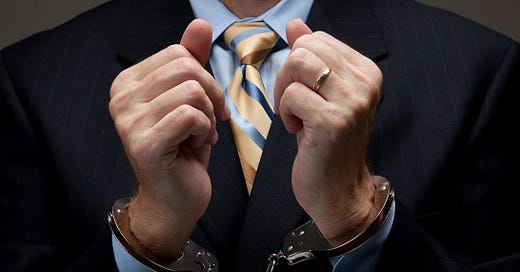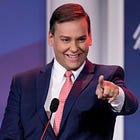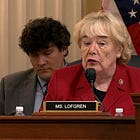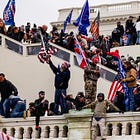Last week was a busy one in the world of white collar crime. There was big news in four different areas: the George Santos investigation, the Varsity Blues prosecutions, the Capitol riot prosecutions, and Supreme Court decisions on the scope of federal mail and wire fraud. Here’s a recap of the developments.
The George Santos Indictment
Freshman Republican Congressman George Santos was elected last November to represent a district that covers portions of Queens and Nassau Counties in New York. Shortly after his election, a series of press reports revealed that during the campaign he had repeatedly lied about his background, including his education, employment history, and claimed Jewish heritage.
Last January I wrote about why these lies, while deplorable, probably weren’t criminal. I noted, however, that there were other questions swirling around Santos’s finances, and concluded: “When it comes to federal crimes, the most likely potential charges relate to Santos’s personal and campaign finances and reports he filed with the federal government, not his phony resume.”
Last week federal prosecutors in Brooklyn charged Santos with those crimes. The thirteen-count indictment includes seven counts of wire fraud, three counts of money laundering, two counts of false statements to the government, and one count of theft of government funds.
Here’s how the charges break down:
Fraudulent Campaign Contributions Scheme: There are five counts of wire fraud for an alleged scheme where Santos defrauded political supporters. Santos created an LLC and used it to solicit donations by falsely claiming the money would be used for his 2022 campaign. Once the donations came in, he allegedly transferred the money to his own bank accounts and then used it for personal expenses such as designer clothing and to pay personal debts.
Side note: this same legal theory underlies one area of the investigation of former president Trump by special counsel Jack Smith. In what the Congressional January 6 committee called “The Big Rip-Off,” Trump and the Republican National Committee allegedly solicited millions of dollars from donors by claiming the money would be used to contest the election and fight (nonexistent) voter fraud, and then used the money for other purposes. As in the Santos case, the likely charge for that scheme would be wire fraud. I wrote about this potential “sleeper charge” in the special counsel investigation in this post:
Money Laundering: The money laundering counts are based on Santos’s transfers of the campaign contribution scheme proceeds from the LLC’s bank account to his personal bank accounts. The money laundering statute in question, 18 U.S.C. 1957, is violated when a defendant knowingly engages in a monetary transaction exceeding $10,000 with the proceeds of criminal activity.
Unemployment Insurance Fraud Scheme: Two more counts of wire fraud are based on an unrelated scheme where Santos allegedly fraudulently obtained unemployment benefits during the Covid crisis. He repeatedly certified that he was unemployed, when in fact he was working at a Florida-based investment firm and earning $120,000 per year. As a result of this scheme, Santos allegedly received more than $24,000 in unemployment benefits to which he was not entitled.
False Statements: Santos also is charged with two counts of 18 U.S.C. 1001, false statements to the government. In 2020 and 2022, candidate Santos filed financial disclosure statements with the government as required by the Ethics in Government Act. These counts allege that Santos lied on those forms about his salary, finances, and bank accounts.
Theft of Government Property: Finally, there is one count of theft of government property, based on the allegation that Santos stole the unemployment benefits.
One of the bigger mysteries surrounding Santos’s campaign finances relates to a $700,000 loan he initially claimed he made to his campaign out of his own funds. There is no apparent source for that money. This indictment doesn’t directly address that mystery, although as the case progresses we may learn more.
The maximum penalty for each mail fraud count is 20 years in prison. For money laundering and theft it is 10 years, and for false statements 5 years. Santos pleaded not guilty and has vowed to fight the charges. But this kind of case involves documents and bank records that tend to speak for themselves. Couple that with the fact Santos is already established as a serial liar and it’s not clear what kind of defense he might hope to present. A guilty plea is the most likely outcome.
The Varsity Blues Appeal
The Varsity Blues scandal involves parents who worked with college admissions counselor Rick Singer to get their children into elite universities through deceptive means. The high-profile scandal has captured the public imagination, ensnared celebrities, and inspired a Netflix special. Longtime readers know I’ve been critical of this prosecution from the beginning – you can see some of my earlier posts here, here, and here.
Singer operated two different kinds of schemes. In the first, Singer and the parents would falsify a student athlete’s record to make them appear eligible to be a recruited college athlete. In exchange for substantial donations from the parents, coaches at universities such as USC and Yale would then arrange for the unqualified student to be offered admission. In some cases the donations went only to the university, while in other cases Singer made payments to the coaches themselves.
In the second type of scheme, parents paid Singer to arrange for an associate to take college entrance exams for their student, change the student’s answers, and/or arrange for the student to have extra time, in order to improve the student’s ACT or SAT score.
More than four dozen parents, coaches, and college staff ultimately were indicted. Most of them chose to plead guilty and did not challenge the government’s legal theories. But two parents, Gamal Abdelaziz and John Wilson, went to trial and were convicted of multiple crimes. They appealed to the U.S. Court of Appeals for the First Circuit, and last week that court threw out almost all of their convictions.
(Full disclosure: I was part of a group of law professors that filed a brief in the First Circuit arguing the government’s bribery theory was flawed.)
First, the court held that if Singer paid money only to a university athletic program and not to a coach individually, that payment cannot be charged as a bribe of the coach. In other words, a payment to a principal, which benefits the principal, cannot be considered a bribe of the principal’s agent.
Second, the court rejected the government’s theory that admissions slots at a university always constitute property for purposes of federal mail and wire fraud. If upheld, this theory would mean that embellishing your child’s abilities on a preschool application or lying about your golf handicap when applying to a country club could be a twenty-year federal felony. That theory, the court held, sweeps far too broadly.
Third, the court agreed that the government improperly charged the case as one big conspiracy. As a result, prosecutors were able to introduce evidence regarding actions of other alleged co-conspirator parents that were far more egregious than the actions of Wilson and Abdelaziz — even though those other parents were not on trial. The court ruled that Wilson and Abdelaziz were prejudiced by the admission this evidence and so were entitled to a new trial.
The government could seek to retry these defendants on the greatly reduced playing field allowed by the First Circuit’s decision, but it’s unclear whether it will. Some other defendants who pleaded guilty might now move to withdraw their guilty pleas, depending on the facts of their own cases.
The Capitol Riot and Obstruction of Justice
Last Thursday the U.S. Court of Appeals for the D.C. Circuit heard oral arguments in the case of United States v. Thomas Robertson. This is one of the appeals from convictions of those who took part in the riot at the U.S. Capitol on January 6, 2021. Among other things, Robertson was convicted of obstruction of justice for interfering with the Congressional proceeding to certify the results of the 2020 presidential election.
I wrote here back in 2021 about this obstruction charge as applied to the Capitol riot. I wrote about the issue again, including a discussion of the Robertson case, earlier this month.
The main issue in Robertson’s appeal is the proper definition of “corruptly” in the obstruction statute, 18 U.S.C. 1512(c). That statute makes it a crime to corruptly obstruct, influence, or impede any official proceeding, including a Congressional proceeding. Because there are many lawful ways to seek to influence a Congressional proceeding, such as lobbying or peaceful protests, the requirement of corrupt intent is a key element of this crime.
Robertson’s attorney argued that for a defendant to have corrupt intent under this statute, he must be dishonestly seeking to obtain some personal benefit for himself or another. This “personal benefit” definition has been applied only in tax cases, where the law generally requires a higher level of intent. The judges did not seem persuaded the same standard should apply to obstruction.
The government attorney argued a defendant can be found to have acted corruptly if he acted through independently unlawful means or was animated by an unlawful purpose. Seeking a personal benefit could be one way to prove a defendant had an unlawful purpose, he argued, but it is not required in all cases. If a defendant acted to obstruct through independently unlawful means, as Robertson did, that alone is enough to establish corrupt intent.
The idea to apply the “personal benefit” test came from Judge Walker’s separate opinion in the Fischer case, discussed in my earlier post. Judge Walker also suggested future D.C. Circuit panels might be bound by his view, although the other two judges disagreed. The Robertson court asked the parties for supplemental briefs on the effect of the Fischer decision, but at oral argument it didn’t even come up. It appears the Robertson panel is going to decide the definition of “corruptly” itself and does not feel bound by Fischer.
Robertson’s attorney objected to the “independently unlawful” standard by noting a protestor who stands up and yells something to disrupt a Congressional hearing normally faces at most only a misdemeanor charge. But because that conduct is “independently unlawful,” that same protestor might now face a 20-year felony if the government’s test is adopted.
In the exercise of prosecutorial discretion, prosecutors are extremely unlikely to pursue an obstruction charge for such a political protestor and have not done so in the past. And as Judge Pan noted during the argument, the statutory maximum would almost certainly never be applied in such a case.
But to respond to such a hypothetical, the government attorney suggested the court could rule that, for purposes of this case, independently felonious criminal conduct establishes corrupt intent. That would leave for another day whether misdemeanor conduct would also suffice – although the government attorney noted the court was not likely to see any such cases in connection with the January 6 protests.
The ”independently felonious” standard would be the narrowest way to resolve the case and it appeared to have some appeal for the judges. I wouldn’t be surprised to see the court adopt that standard. If it does, that will preserve the viability of the obstruction charge for virtually all Capitol riot defendants, as well as for former president Trump and others who did not take part in the riot but used other felonious means to seek to overturn the election.
Supreme Court Further Narrows Corruption Laws
On Thursday the Supreme Court handed down two important decisions on the scope of federal mail and wire fraud: Ciminelli v. United States and Percoco v. United States. The sister cases arose from a major development initiative knows as the “Buffalo Billion,” which funded projects in the Buffalo, N.Y. area.
Ciminelli is a developer who was convicted at trial of wire fraud and conspiracy to commit wire fraud. He was charged with taking part in a bid-rigging scheme to ensure that his company would obtain lucrative “Buffalo Billion” contracts. At trial the government didn’t seek to prove the state had lost any money, because Ciminelli’s company did adequately complete the contracts. Instead, prosecutors relied on the “right to control” theory. That theory, popular in the Second Circuit, held that fraud can be established if the defendant deprives a victim of potentially valuable information necessary to make economic decisions. The bid rigging scheme, prosecutors charged, deprived the state of important information it would have used to select a contractor, and so the state was defrauded of its right to control its valuable economic decisions.
The “right to control” theory has been on life support for a long time. The Supreme Court has repeatedly held that a scheme to defraud requires a deprivation of money or property and that schemes to deprive a victim of other rights or interests are not fraud. The most recent example was the “Bridgegate” case, where the Court unanimously held that a scheme to manipulate lane closures on the George Washington Bridge to punish a political opponent was not a scheme to defraud under federal law. (Another example of this doctrine is the Varsity Blues decision discussed above, where the First Circuit held, based on these Supreme Court precedents, that admission slots at a university are not “property” for purposes of federal fraud law.)
Given this trend, it was apparent the Supreme Court would pull the plug on the “right to control” theory when the right case teed up the issue. In fact, it was so clear the theory was doomed that in the Supreme Court the government abandoned it and tried unsuccessfully to argue that Ciminelli’s convictions could still be upheld on an alternative basis.
In an opinion by Justice Thomas, the Court ruled 9-0 that the theory is invalid: "The wire fraud statute reaches only traditional property interests. The right to valuable economic information needed to make discretionary economic decisions is not a traditional property interest. Accordingly, the right-to-control theory cannot form the basis for a conviction under the federal fraud statutes.”
This decision was not a surprise and it will not have much effect outside of the Second Circuit, where prosecutors were known for pursuing the theory. There may be some defendants who were convicted in “right to control” cases in the past who now will be able to move to have those convictions vacated.
The companion case, Percoco v. United States, involved the scope of a legal theory known as honest services fraud. In an honest services fraud case, the defendant is charged with depriving a victim not of money or property but of the intangible right of honest services that someone owes the victim. Its most common use is in political corruption cases, where corrupt politicians may be charged with depriving their constituents of the right to the politician’s fair and honest services. In 2010 in Skilling v. United States, the Court held that this theory is limited to cases involving bribes and kickbacks.
Honest services fraud may only be charged where there is a special relationship of trust and confidence that gives rise to an obligation to provide honest and faithful services, such as the relationship of a government official to the public. Percoco involved the question whether someone who is not formally a public official can still owe a duty of honest services to the public.
The defendant Joseph Percoco had served as the executive deputy secretary to New York Governor Andrew Cuomo. In April 2014 he stepped down from his government position for a few months to work on Cuomo’s re-election campaign, returning to the government in December. Prosecutors charged that during that break in his government service he accepted payments from a developer in exchange for agreeing to intervene with government officials on the developer’s behalf in a dispute with a labor union. Based on those payments, a jury found Percoco guilty of bribery on an honest services fraud theory.
Percoco argued he did not owe a duty of honest services to the public because at the time of the alleged bribes he was a private citizen, not a government official. The Second Circuit, however, affirmed his convictions by concluding that although Percoco was not formally in office at the time of the alleged bribes, he could still be found to owe a duty of honest services to the public if the jury found that he “dominated and controlled any governmental business” and that “people working in the government actually relied on him because of a special relationship he had with the government.” Because there was evidence Percoco still had substantial influence over government actors even while he was temporarily out of office, the court of appeals held this standard was met.
The Supreme Court reversed the conviction. In an opinion by Justice Alito, the Court rejected Percoco’s argument for a bright-line rule that someone who is not a government official can never owe a duty of honest services to the public: “Without becoming a government employee, individuals not formally employed by a government entity may enter into agreements that make them actual agents of the government.” In other words, someone can be found to be a de facto government official even if they are not actually on the government payroll.
But this was not enough to save Percoco’s conviction, the Court found, because the jury instructions in his case swept too broadly. The Court noted there have always been “individuals who lacked any formal government position but nevertheless exercised very strong influence over government decisions.” Think, for example, of presidential spouses or siblings, or of seasoned Washington behind-the-scenes advisors. The idea, the Court held, that these private individuals might owe a duty of honest services to the public based on some uncertain measure of how influential they are is too vague.
But other than suggesting that something more akin to a formal agency relationship would be required, the Court did not offer any real guidance on the correct test for finding a duty of honest services in such circumstances. Justice Gorsuch criticized this fact in a concurring opinion joined by Justice Thomas, where he suggested (as had the original dissenters in Skilling) that honest services fraud is impossibly vague in all circumstances.
Although the court reversed Percoco’s convictions, the decision recognizes that in some cases a person not on the government payroll can still be carrying out a government role and assume a duty of honest services to the public. This parallels the language of the federal bribery statute, 18 U.S.C. § 201, which applies not only to federal public officials but also to those acting “for or on behalf of the United States.” That is a sensible result.







